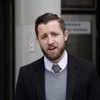A Right Sector fighter from a position on the front line in Donbas. (VICE Reports, 2018)
As the Russian invasion intensifies throughout Ukraine and international humanitarian aid and military support flows into the country, the most controversial elements of the Ukrainian military apparatus are appealing for funding online. At the outset of his national address announcing the all-out attack on Ukraine, Russian President Vladimir Putin said his forces intended to enact the “demilitarisation and de-Nazification” of Ukraine, which was a nod to an old Kremlin talking point that the Ukrainian government was infiltrated by Nazis. Putin was also likely citing two entities that do exist in the Ukrainian military that have bona fide links to the extreme right but are minor players in the defense and government of the country. One is the Azov Battalion, once a far-right paramilitary group that was formally integrated into Ukraine’s National Guard in late 2014 as the war in Donbas began. The other is the Right Sector, an ultranationalist militia, independent of the military, that still maintains a battle group. Both groups were asking for donations—on their website and Telegram page, respectively.“Ukrainian Volunteer Corps ‘Right Sector’ operates normally and performs military tasks,” reads a post on the Right Sector Telegram page, before it asked the public to “[support] us financially in the Russian-Ukrainian war” and offered a name, a contact number, and bank account information. On its official website, the Azov Battalion, which has a symbol that is still a Wolfsangel, made a similar call: “If you want to help the Azov Regiment financially, you can do so now.”Though there’s some debate about how far-right the two groups continue to be, the Ukrainian government is undoubtedly not a neo-Nazi organization. And President Volodomyr Zelenskyy, who’s Jewish, took exception to Putin’s characterization of his country: “How can I be a Nazi?” he said in his national address Thursday. “Explain it to my grandfather, who went through the entire war in the infantry of the Soviet army and died a colonel in an independent Ukraine.”But Mollie Saltskog, a senior intelligence analyst at the Soufan Group, a global intelligence and security consultancy firm based in New York City, said she worries that the online calls of Azov and Right Sector might play into the hands of Kremlin disinformation.“I think this is something that a lot of people don’t understand about Russia’s information influence tactics,” she said. “Russian disinformation narratives, while often aimed at a domestic audience, don’t have to be convincing to be effective in a global audience. Sowing doubt and confusion about the realities is a goal in itself. If you can’t convince them, confuse them.” The irony, as Saltskog explained, is that Russia is a well-known supporter of far-right extremists and has even been accused of harboring them and exporting them to the West in order to destabilize democracies at their doorstep. “The only far-right extremist organization thus far designated by the U.S. as a specially designated global terrorist entity is a Russian organization, which has trained foreigners and also participated in the Ukraine conflict since 2014 on the pro-Russian side,” Saltskog said. With files from Tim Hume.
Advertisement
Advertisement
